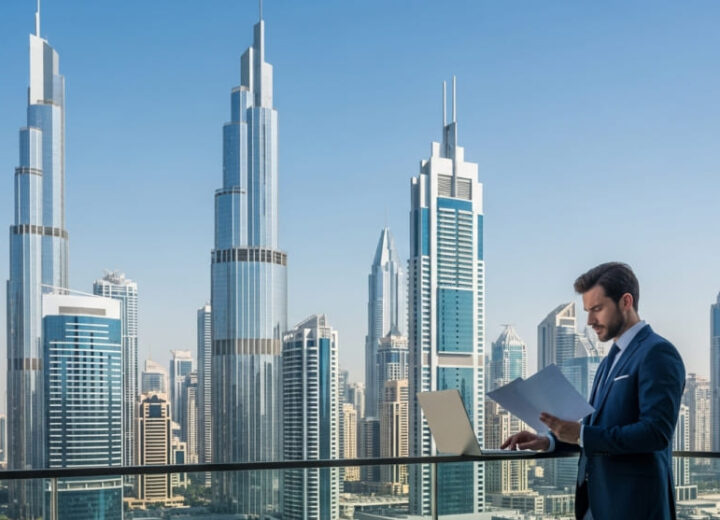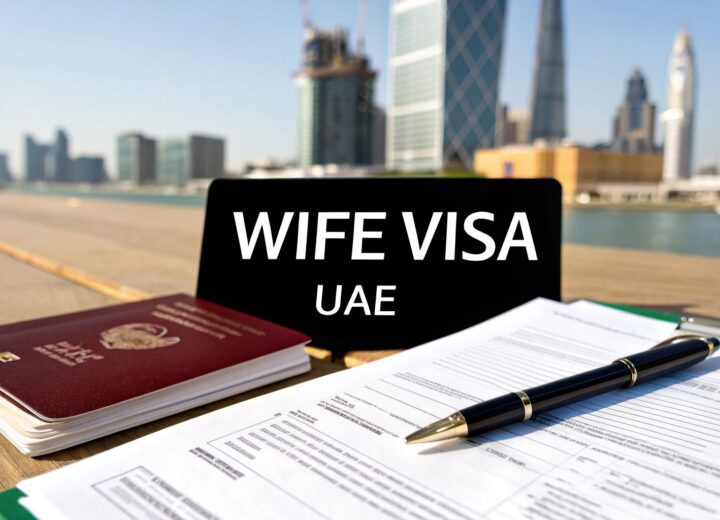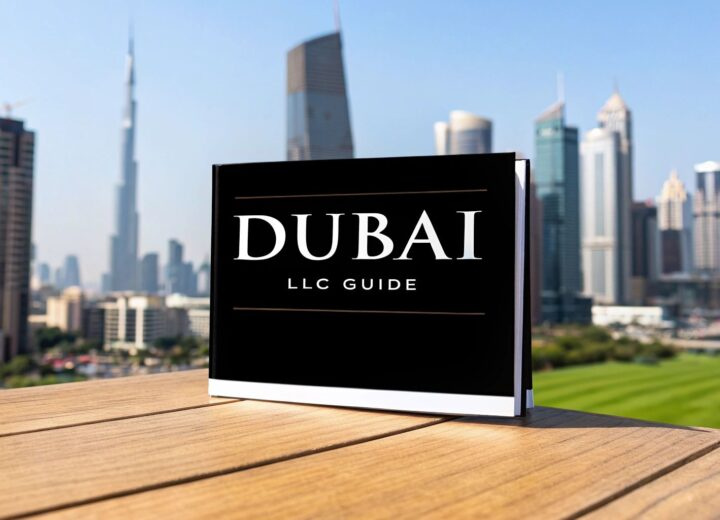So, you've heard about the UAE Mission Visa, but what exactly is it? Think of it as a special-purpose work permit, a fast-track solution for companies needing to bring in foreign professionals for specific, time-sensitive projects. It's a single-entry visa that gets experts on the ground and working legally, typically for up to 90 days, without the full-scale process of a residency visa.
What a UAE Mission Visa Really Means
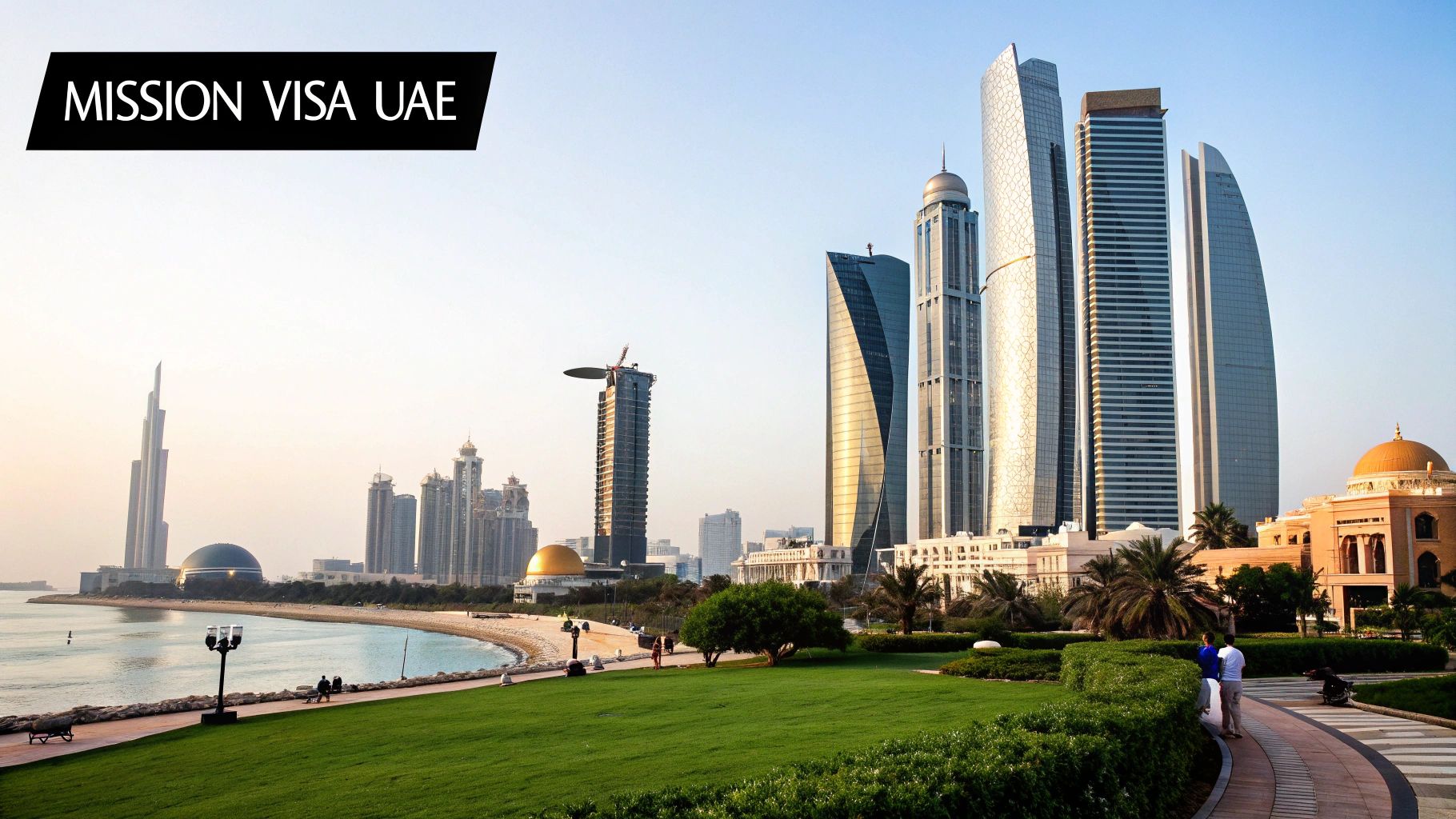
The UAE's visa system can seem like a maze at first glance, but the Mission Visa fills a very specific niche. It's not a residency card; it’s more like a temporary, high-level access pass for a specialist. This is the go-to option when your company—whether it’s based on the Dubai mainland or in a Sharjah free zone—needs to fly in an expert for a mission-critical, short-term assignment.
This visa is all about temporary staffing. It’s custom-built for roles tied to projects with a clear finish line, letting you sidestep the longer, more involved process of a standard two-year employment visa.
To give you a clearer picture, here’s a quick summary of the Mission Visa's main characteristics.
Mission Visa at a Glance Key Features
| Feature | Details |
|---|---|
| Visa Type | Single-entry, short-term work permit. |
| Duration | Issued for 90 days (3 months). |
| Renewability | Can be renewed once for another 90 days. |
| Purpose | For specific, project-based work or temporary assignments. |
| Sponsorship | Must be sponsored by a UAE-based company. |
| Eligibility | Open to professionals and skilled workers based on their qualifications. |
| Exclusivity | Not for tourism or long-term residency. |
This table should help you quickly see if the Mission Visa fits your needs. It's a targeted tool for a very specific business scenario.
Who Is the Mission Visa Really For?
The Mission Visa is a strategic solution for both employers and professionals. It’s strictly for individuals coming to the UAE to do a specific job for a limited period—not for tourists or anyone looking to stay long-term.
It's the perfect fit for:
- Specialist Consultants needed to advise on a particular project phase.
- Engineers or Technicians brought in to install, configure, or repair equipment.
- New Hires on a probationary period before committing to a full residency visa.
- Project Managers tasked with overseeing a short-term initiative from start to finish.
In short, if your business needs a particular skill set that’s crucial for a project but not required permanently, the Mission Visa is almost always the most efficient and compliant way forward.
The UAE government, through the Ministry of Human Resources and Emiratisation (MoHRE), offers these permits to help companies bring in talent for projects lasting up to three months, with the option for a single renewal. The eligibility criteria often hinge on educational qualifications, ensuring that the system is designed to bring in genuine professional expertise across different skill levels.
The Main Purpose and Big Wins
The standout advantages of the Mission Visa UAE are speed and flexibility. The application process is significantly faster than that for a standard employment visa. This agility allows companies to react swiftly when a project suddenly needs a specialist now.
This visa neatly fills the gap between a brief business visit and a two-year residency commitment. It gives companies the power to tap into a global talent pool for crucial, short-term tasks, all while staying fully compliant with UAE labour laws.
By going this route, businesses can also keep a tight rein on costs. You're hiring an expert only for the exact period you need them, cutting out the financial and administrative overhead tied to a full-time, long-term employee. For the professionals themselves, it’s a fantastic, legal way to work on exciting projects in the UAE and gain international experience without the upheaval of a full relocation.
A Mission Visa Compared to Other UAE Work Permits

Trying to figure out the UAE visa system can feel a bit like navigating a maze. But getting it right from the start is absolutely crucial to keep your projects on track and avoid any costly hiccups. The mission visa UAE has a very specific job to do, and it’s important to understand how it differs from a tourist, visit, or standard employment visa.
One of the most common grey areas for businesses is the line between a business visit and actual, hands-on work. You can absolutely fly in on a visit visa for meetings, to scope out a project, or to attend a conference. What you can't do is roll up your sleeves and perform paid work. That’s the exact gap the mission visa was created to fill.
It’s the official green light for a professional to be on-site and fully involved in a project for a set period. Think of a specialist engineer brought in from Germany to oversee a critical three-week installation. They can’t legally do that on a visit visa—they need a mission visa.
Mission Visa vs. Employment Visa
The comparison I get asked about most often is how a mission visa stacks up against a standard two-year employment visa. The easiest way to think about it is like renting a specialised tool versus buying it outright. The mission visa is your rental for a specific, temporary job. The employment visa is the long-term purchase for a permanent member of your team.
An employment visa is a much bigger commitment, involving a more detailed process that includes getting an Emirates ID and establishing formal residency. It’s for someone who is joining your company for the long haul. On the other hand, the mission visa UAE is a faster, more agile solution for assignments with a clear finish line, usually lasting up to 90 days.
Keeping it Separate from Tourist and Visit Visas
This one is simple: tourist and visit visas are for just that—tourism and visiting. They are not work permits. These visas are for leisure, seeing family, or attending business meetings where you aren't actively working for a UAE-based entity.
Trying to get an employee to work on one of these visas is a serious misstep. It can lead to hefty fines, deportation, and blacklisting for both the individual and the sponsoring company.
The core difference comes down to intent and legality. A mission visa is a work permit at its heart—a temporary one, but a work permit nonetheless. Tourist and visit visas are simply permission to be in the country, not to be employed here.
To make these distinctions crystal clear, let’s lay it all out side-by-side.
A Clear Comparison of Key Visa Types
Knowing the specific purpose and limitations of each visa is essential for any business operating in the UAE. This table breaks it down simply, helping you see exactly which visa fits your situation.
| Feature | Mission Visa | Standard Employment Visa | Tourist/Visit Visa |
|---|---|---|---|
| Primary Purpose | Short-term, project-based work. | Long-term, full-time employment. | Tourism, visiting family, business meetings. |
| Duration | Up to 90 days, renewable once. | Typically 2 years, renewable. | Usually 30, 60, or 90 days, non-work. |
| Sponsorship | Must be sponsored by a UAE company. | Must be sponsored by a UAE company. | Can be sponsored by airlines, hotels, or relatives. |
| Work Legality | Legally permitted to work and earn. | Legally permitted to work and earn. | Strictly forbidden from working. |
| Processing Time | Relatively fast and streamlined. | More comprehensive and takes longer. | Generally quick and simple. |
| Associated Perks | No Emirates ID or residency benefits. | Includes Emirates ID, residency, bank account. | No long-term residency benefits. |
As you can see, choosing the right visa is everything. For a company in Dubai or Abu Dhabi that needs an expert on the ground for a three-month project, the mission visa is the perfect fit—it's compliant, efficient, and cost-effective. It gives you the power to bring in global talent quickly, without the longer administrative process of a full residency visa.
To get into the nitty-gritty, you can explore a full breakdown of the Mission Visa in Dubai and what it takes to get one processed.
Navigating the Application Process, Step by Step
Getting a mission visa in the UAE isn't a single event; it's a well-defined journey. For everything to run smoothly, it’s vital to understand the sequence of events and, crucially, who is responsible for what. Both the employer and the employee have key parts to play.
The good news is that the process has become much more straightforward over the years. The UAE government has made a real push to cut down on red tape, meaning you can get your expert on the ground and working on your project much faster than before.
A New Era with the Work Bundle Platform
One of the biggest game-changers here is the Work Bundle platform. This initiative is a core part of the UAE's Zero Bureaucracy Programme and has genuinely simplified how private sector work permits are handled.
What used to be five separate, often confusing, procedures for work permits and residency has been rolled into one streamlined digital process. The results are pretty staggering: steps have been cut from 15 down to just 5, the document checklist has shrunk from 16 to 5, and the whole thing now takes around 5 working days instead of 30.
This visual guide breaks down the key stages, giving you a clear picture of the timeline from start to finish.
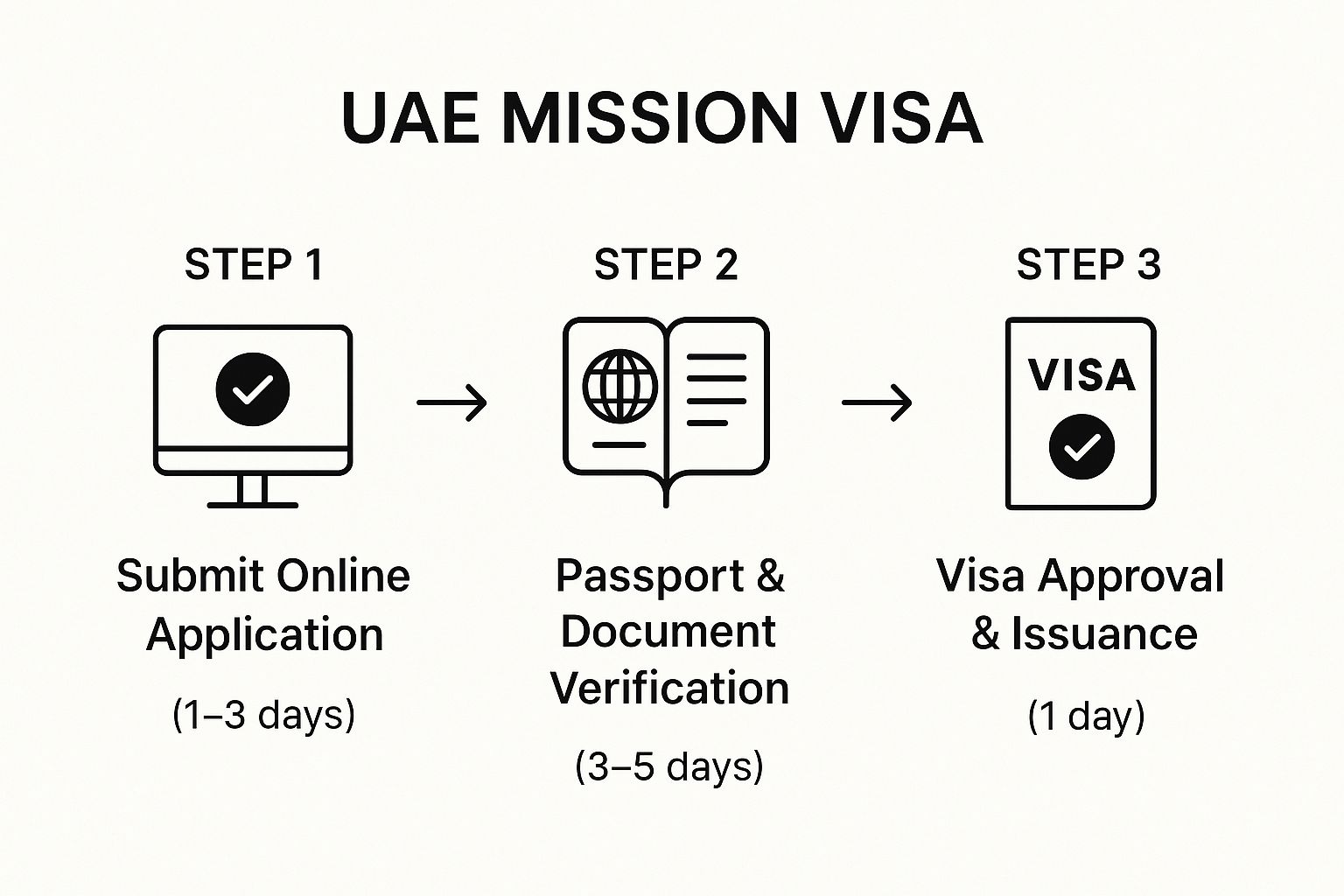
As you can see, the process flows logically from one step to the next, ensuring all the necessary checks are completed efficiently.
To make things even clearer, let's look at how the responsibilities are split between the company and the incoming professional.
Mission Visa Application Stages: Employer vs. Employee Responsibilities
Navigating the application requires a team effort. This table clearly outlines who handles which task at each stage of the journey.
| Application Stage | Employer Responsibility | Employee Responsibility |
|---|---|---|
| 1. Quota & Initial Filing | Secure a mission visa quota from MoHRE. Submit the official visa application with all required corporate and employee documents. | Provide all necessary personal and professional documents (passport copy, qualifications, etc.) accurately and on time. |
| 2. Entry Permit Issuance | Liaise with MoHRE during the document verification phase. Receive the approved Mission Visa Entry Permit. | Remain available to clarify any details or provide additional documents if requested by the employer. |
| 3. Arrival in the UAE | Send the entry permit to the employee and coordinate their travel arrangements. | Travel to the UAE with a printed or digital copy of the entry permit to present at immigration. |
| 4. In-Country Formalities | Arrange and schedule the mandatory medical fitness test. Prepare and finalise the official labour contract. | Attend and complete the medical fitness test. Review and sign the official labour contract. |
| 5. Final Approval | Submit the signed contract and medical results to the authorities for final processing. Collect the labour card once issued. | Collect the stamped passport and labour card, officially authorising work to commence. |
Having a clear understanding of this division of labour is the secret to a hassle-free application.
Stage 1: The Company Kicks Things Off
The process always starts with the employer. Before you can even think about bringing someone over, your company needs to get a mission visa quota from the Ministry of Human Resources and Emiratisation (MoHRE).
Think of this as your company’s ticket to sponsor short-term staff. Your Public Relations Officer (PRO) will usually handle this by submitting your company’s trade licence and other official documents to MoHRE.
Once that quota is in hand, you can move forward with submitting the actual visa application for your chosen candidate, typically through MoHRE’s online portal.
Stage 2: Getting the Green Light to Travel
With the application submitted, MoHRE officials will carefully review all the paperwork. This is a critical checkpoint. Any small mistake or missing document can bring the whole process to a halt, so getting it right the first time is essential.
After a successful review, the authorities issue a Mission Visa Entry Permit. This is the official document that gives your employee permission to fly to the UAE for their project.
It’s important to remember this isn't the final visa stamp in their passport—it’s the key that opens the door. The employee absolutely must have a copy of this permit with them when they travel.
Stage 3: Arrival and Final Steps in the UAE
Once the employee lands in the UAE and presents their entry permit, their passport will be stamped at immigration. But the job isn't quite done yet.
They will likely need to complete a medical fitness test, which is standard practice for most work visas here. This is a routine check for communicable diseases. After that, a formal labour contract is signed, submitted, and approved.
This final step makes the employment relationship official under UAE law. Once the contract gets the thumbs-up, the employee is issued their labour card, and they are officially cleared to start work.
Throughout this journey, having an expert on your side can make all the difference. Many companies find that using professional Corporate PRO Services is invaluable. A good PRO team knows the system inside out, deals with the government bodies on your behalf, and helps you sidestep the common pitfalls that can cause costly delays.
Your Essential Document Checklist for a Mission Visa
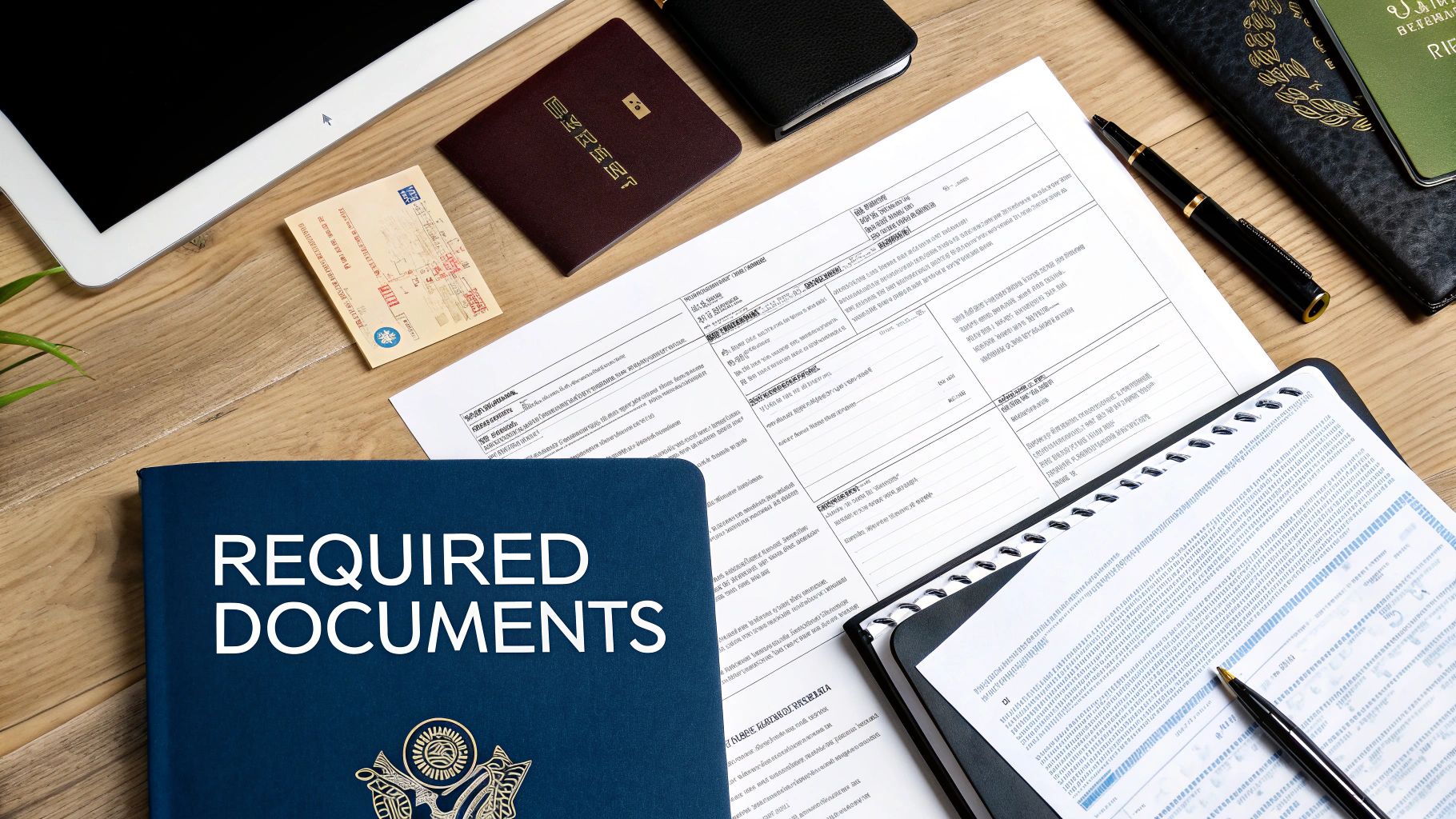
A successful mission visa application really comes down to careful preparation. Think of it like a recipe – if you miss a single ingredient, the final dish just won’t work. To avoid any frustrating delays, it's absolutely vital to have every document perfectly in order before you even think about starting the application.
The whole process involves two main parties: the sponsoring company and the employee. Each side has a specific list of documents to provide, and getting this right from the very beginning is the key to a smooth, quick submission.
Let's walk through exactly what’s needed from both the company and the individual to get your mission visa in the UAE application right on the first try.
What the Sponsoring Company Must Provide
The employer is the one who kicks off the entire process, so the authorities first need to see that the company is a legitimate, active business in the UAE. The company’s Public Relations Officer (PRO) is usually the one who pulls all of this together for the submission.
Essential Corporate Documents:
- A Valid Trade Licence: This is non-negotiable. It’s the core document proving your company is legally registered and allowed to operate in the UAE. Make sure it's current.
- An Establishment Card: This card, issued by the immigration authorities, officially registers your company with them and is required for any and all visa transactions.
- MoHRE Approval & Quota: Before a company can even apply for an individual, it must be registered with the Ministry of Human Resources and Emiratisation (MoHRE) and have an approved mission visa quota for that specific job.
What the Employee Must Prepare
While the company sorts out the corporate paperwork, the employee needs to provide accurate personal and professional documents. Any mistakes or missing details at this stage can lead to major setbacks.
Here’s a clear checklist of what the employee needs to get ready:
- A Valid Passport Copy: Your passport must have at least six months of validity left from the application date. It also needs a minimum of two blank pages.
- Passport-Sized Photographs: These need to be recent and must follow the specific guidelines set by the UAE government, like having a plain white background and showing clear facial features.
- Attested Educational Certificates: This is a huge one, especially for skilled roles, and it’s where many people get tripped up.
The certificate attestation process is a formal verification chain that cannot be skipped. Your degree or diploma has to be authenticated first by the Ministry of Foreign Affairs in your home country, and then by the UAE Embassy in that same country. Only then will it be accepted by the authorities here in the UAE.
This multi-step verification is how the government confirms that your qualifications are genuine. I can't stress this enough: start this process as early as possible. It can easily take several weeks to complete. For anyone considering a more permanent position down the line, understanding the full requirements for an employment visa in the UAE is a good idea, as these document rules carry over.
Honestly, failing to properly attest your certificates is one of the top reasons mission visa applications get rejected. It's not a step you can rush or find a shortcut for, so plan ahead. By making sure every single document on this checklist is present and correct, you’re setting yourself up for a fast and successful visa approval.
Navigating Your Mission Visa's Lifecycle: Validity, Renewals, and Cancellation
A UAE Mission Visa isn't an open-ended pass; it's a purpose-built tool for temporary, specialised work, and its lifecycle is just as specific. Getting a handle on its validity period, renewal rules, and the all-important cancellation process is non-negotiable for staying on the right side of UAE labour laws.
The Initial 90-Day Window
Think of a standard mission visa UAE as a 90-day project pass. This is the initial timeframe granted from the date the visa is issued, giving your specialist enough time to fly in, get the job done, and head home. It's a single-entry permit, which means the clock is ticking, and once they leave the country, the visa has served its purpose.
This fixed duration is actually a huge benefit for companies. It creates a clear and predictable schedule for short-term projects, making it much easier to budget and plan without getting tangled up in the complexities of a full residency visa.
When the Project Needs More Time
So, what if the project hits a snag or the scope expands? The system has a bit of flexibility built-in. You can apply for a one-time renewal of the mission visa, which adds another 90 days to the clock. This gives you a total potential stay of up to 180 days – a solid six months.
This extension is a lifesaver for those projects that just need a little extra runway. The key, however, is to be proactive. The sponsoring company has to kick off the renewal application before the original 90-day visa expires. This means filing a new request and paying the renewal fees through the Ministry of Human Resources and Emiratisation (MoHRE).
Closing the File: The Formal Cancellation Process
Once the mission is accomplished and the specialist's work is finished, the job isn't quite over for the sponsoring company. You are legally required to formally cancel the mission visa. This isn't just a suggestion; it's a mandatory step to officially close out the temporary employment record. Skipping it can lead to hefty fines and other penalties.
The cancellation process is straightforward but must be done correctly:
- File the Cancellation Request: Your company's Public Relations Officer (PRO) will submit the cancellation application to MoHRE.
- Settle Up: You need to make sure all final payments and settlements due to the employee have been cleared according to their contract.
- Confirm Departure: The visa holder has to leave the UAE before the visa officially expires or as the cancellation is being finalised.
Properly cancelling the visa is crucial. It keeps your company in good standing with the authorities and ensures the employee won't face any issues if they want to work in the UAE again in the future. For companies in Dubai, Sharjah, or Abu Dhabi, working with a firm that provides expert Corporate PRO Services can make this process completely seamless.
A common mistake is just letting the visa "expire." That’s not how it works. An official cancellation is a formal procedure that signals to the government that the work agreement has ended, protecting both you and the employee from any future problems.
The High Cost of Overstaying
The UAE government is serious about visa regulations. Overstaying a mission visa, even for a day, triggers daily fines that can stack up alarmingly fast. These fines must be paid in full before the individual is allowed to leave the country.
But the consequences can go far beyond just money. Overstaying can also lead to:
- A travel ban or "blacklisting," preventing any future entry into the UAE.
- Deportation.
- Legal trouble for both the employee and the sponsoring company.
It's absolutely critical to track visa expiry dates with military precision and ensure a timely exit, renewal, or cancellation. While the UAE offers many types of short-term entry permits, like those under the broader visit visa programme, each has its own strict purpose and rules. For a deeper dive into the UAE's flexible entry options, the official UAE government portal is the best source of information.
Working with Experts for a Smooth Visa Process
Trying to navigate the UAE’s immigration system on your own can quickly turn into a full-time headache. A tiny mistake on a form or a missed deadline can cause frustrating delays, outright rejections, and even financial penalties. This is why bringing in professional business setup consultants isn't just another expense—it's a smart investment in getting things done right, the first time.
Think of an expert partner as your personal guide through the maze of government procedures. They spot and prevent common errors before they can derail your application. They make sure every single document is correct, properly attested, and submitted on time. Since regulations can and do change, having a specialist in your corner means your application for a mission visa UAE will always be compliant.
The Real Value of PRO Services
Hiring a team that specialises in Corporate PRO Services and document attestation is one of the best ways to cut through the red tape. These professionals handle everything for you, dealing directly with government bodies like MoHRE and freeing you up to focus on what actually matters—your business.
A professional PRO team is essentially your company's dedicated government liaison. They master the complexities of the system so you can concentrate on your core operations and the project you're launching.
This kind of expertise is vital, whether your company is on the mainland in Dubai, Sharjah, or Abu Dhabi, or set up in one of the many free zones. Each jurisdiction has its own specific rules, and a good PRO knows them inside and out, ensuring a seamless application process. To get a better sense of how different visas are processed, you can explore the requirements for an investor visa in the UAE and see just how crucial that specialised knowledge is.
A Smart Move for Your Business
At the end of the day, using expert support turns a potentially confusing and stressful task into a straightforward, predictable one. The advantages go well beyond just getting the paperwork right.
- Save Your Time: Professionals know the shortcuts and how to avoid the roadblocks, speeding up the entire process.
- Stay Compliant: They keep on top of ever-changing laws, protecting your business from costly mistakes and penalties.
- Less Stress: Handing off the administrative load lets your team focus on business growth and the success of your mission.
- 24/7 Peace of Mind: Access to round-the-clock support means you get answers to your questions exactly when you need them.
By working with specialists in Corporate PRO Services and Attestation Services, you’re not just filing for a visa; you’re ensuring you can bring the talent you need into the country, right when you need them, without any of the usual hassle.
Your Top UAE Mission Visa Questions Answered
Even when you think you've got the process down, a few nagging questions always seem to surface. It’s completely normal. Let's tackle some of the most common queries I hear from clients to clear up any lingering confusion about the mission visa in the UAE.
Can I Convert My Mission Visa to an Employment Visa?
This is easily the most popular question, and the short answer is no. Think of a mission visa as a specific, short-term pass for a single project. You can't simply swap it for a long-term employment visa while you're still in the UAE.
So, what if the company wants to hire you full-time? The correct procedure involves a few key steps. First, your employer must officially cancel the mission visa. After that’s done, you'll need to leave the country. Only then can the company start a fresh application for a standard two-year employment visa.
The key takeaway here is to treat the mission visa and employment visa as two completely separate tracks. Trying to merge them or switch mid-stream without exiting the country will only lead to a rejected application and unnecessary complications.
Is Medical Insurance a Must-Have?
Absolutely. Providing medical insurance isn't just a good idea; it's a legal requirement for anyone on a mission visa in the UAE. The company sponsoring you is responsible for arranging and paying for a basic health insurance plan that covers you for your entire stay.
This is a non-negotiable part of the UAE's labour laws. It’s in place to make sure every temporary employee has access to medical care if they need it while working here.
Can I Bring My Family Over on a Mission Visa?
Unfortunately, no. The mission visa is designed for one person—the professional hired for the project. It doesn't come with any provisions to sponsor family members like a spouse or children.
Family sponsorship is a feature tied to the standard, long-term residency and employment visa, which has its own set of requirements, including a minimum salary. Because the mission visa is temporary by nature, it's not set up for family residency. If having your family with you is a deal-breaker, you'll need to explore the long-term employment visa route instead.
What Should I Do if My Application Gets Rejected?
A visa rejection is always frustrating, but it's not necessarily the end of the road. The authorities don't usually spell out the exact reason, but it often comes down to common culprits like missing documents, a simple mistake on the form, or not quite meeting the eligibility criteria.
When a rejection happens, the company's Public Relations Officer (PRO) can follow up with the immigration department to try and understand the problem. Often, it's something fixable, like getting an educational certificate properly attested. The company can then correct the issue and re-submit the application.
Of course, resubmitting doesn't guarantee approval. This is precisely why working with experienced visa professionals is so valuable. A good PRO service can spot potential issues before you even apply, dramatically boosting your chances of getting it right the first time and helping you figure out the best way forward if you do hit a snag.
Getting the details right on a mission visa in the UAE is crucial. At PRO Deskk, we take the guesswork out of the process with our end-to-end business setup and visa solutions. Here's how we can help you succeed:
✅ Specialists in Mainland Company Formation in Dubai, Sharjah & Abu Dhabi
✅ Specialists in Freezone Company Formation across the UAE
✅ Specialists in Golden Visa on Property and Investor Visa
✅ Specialists in Corporate PRO Services and Attestation Services
✅ 24/7 Support Service – Always here when you need us
✅ Cost-Effective Business Setup Solutions tailored to your needs
✅ Enjoy UAE Tax Benefits for International Entrepreneurs
📞 Call Us Now: +971-54-4710034
💬 WhatsApp Us Today for a Free Consultation at https://prodesk.ae to ensure your visa process is seamless and successful.
Article created using Outrank

